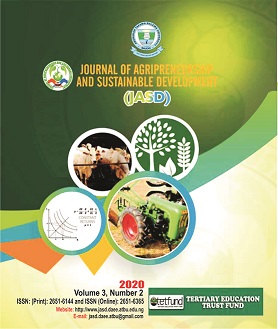APPRAISAL OF THE INVESTMENT VIABILITY OF SESAME ENTERPRISE AMONG SMALLHOLDER FARMERS IN BENUE STATE, NIGERIA
DOI:
https://doi.org/10.59331/jasd.v3i2.127Keywords:
Appraisal, Investment, Sesame, Smallholder farmers, ViabilityAbstract
The study appraised the investment viability of sesame production among smallholder farmers in Benue State, Nigeria. A multistage sampling technique was used to collect data from 264 sesame farmers. Benefit cost ratio (budgetary technique) was used to appraise the viability made in sesame production in 2015, 2016 and 2017 production season and ordered logistic regression model was employed to determine the factors influencing the level of investment. The level of investment was categorized into three levels as: high investment (>₦60,000), moderate investment (₦31,000 - ₦60,000) and low investment (₦1,000 - ₦30,000). The analysis of benefit cost ratio revealed that the viability of sesame in 2015, 2016 and 2017 production season stood at 0.66 with a viability interval of 34%. The analysis of the ordered logistic regression showed that access to credit, male gender, married farmers, market information, membership of cooperatives, farmer’s age, household size, level of education and years of farming experience were positive and significant factors that influenced level of investment in sesame production. The study concluded that sesame production is profitable, thus a viable enterprise in the study area. It recommended that government should facilitate the availability of credit to sesame farmers at low interest rate as this would reduce the constraint of inadequate fund impeding smallholder farmers and thus, enhance high level of investment in sesame production.
Downloads

Downloads
Published
How to Cite
Issue
Section
License
Copyright (c) 2022 Journal of Agripreneurship and Sustainable Development

This work is licensed under a Creative Commons Attribution 4.0 International License.






